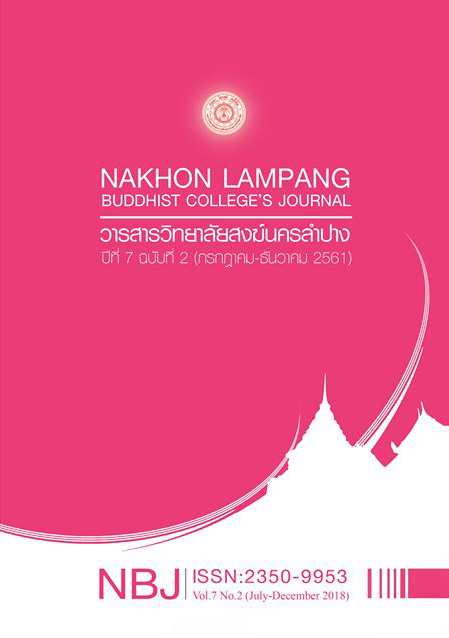THE MODEL OF PARTICIPATORY MANAGEMENT DEVELOPMENT OF BUDDHIST SUNDAY SCHOOLS IN SANGHA ADMINISTRATIVE REGION 13
Main Article Content
Abstract
The objectives of this research were; 1) To study the current management conditions and problems of Buddhist Sunday Schools in clergy, Region 13 2) To develop the participatory management of Buddhist Sunday Schools in clergy Region 13, and 3) To propose the participatory management model of Buddhist Sunday Schools in clergy Region 13. The mixed research methodology was used in the study. The qualitative data were collected from documents, research works, in-depth interviews with 15 experts, and focus group discussions with 13 experts, then analyzed by content analysis. The quantitative information was obtained by questionnaires from 390 samples and analyzed by frequency, percentile, mean and standard deviation. The findings were as follows.
1. The current management conditions of Buddhist Sunday Schools in clergy, Region 13 were divided into 4 sections; academic, personnel, budget, and general management. The problems were that; In academic management, the school administrators lacked of knowledge and understanding in management, and teachers lacked of knowledge, experiences and techniques in teaching. In budget, the granted budget was not sufficient for school management and more budgets were raised from other sources. In personnel management, a number of teachers were not matched with student number and the teachers lacked of teaching experiences. In general management, preaching halls, ordination halls and temple school classrooms were mostly used for Buddhist Sunday schools.
2. The development of participatory management of Buddhist Sunday schools in clergy Administrative Region 13 must be done in 4 aspects; academic, personnel, budget and general management under 4 participatory components; 1) participatory decision, participatory action, participatory advantage gaining, and participatory evaluation supported by principles of Aparihaniya Dhamma, Samgahavatthu Dhamma, and Saraniya Dhamma. The academic management should be enhanced and supported by the principles of Aparihaniya Dhamma, the budget by Samgahavatthu Dhamma, and personnel management by Saraniya Dhamma. In general management, Buddhist Sunday Schools should be improved into learning resources and religious activity centers for children and people in general.
3. The participatory management model of Buddhist Sunday Schools in clergy, Region 13 consists of participatory thinking, doing, decision making, advantage gaining and evaluation in 4 aspects of management, integrated with Buddhist principles. Academic management is integrated with the Threefold Training, budget management with sacrifice, honesty and transparency, personnel management with loving-kindness and positive thinking, and general management with Buddhist based activities.
Article Details
References
กรมศาสนากระทรวงวัฒนธรรม. ข้อมูลสถิติจากเอกสารโครงการจัดประชุมเชิงปฏิบัติการผู้บริหารศูนย์ศึกษาพระพุทธศาสนาวันอาทิตย์เพื่อเฉลิมฉลองพุทธชยันตี 2600 ปีแห่งการตรัสรู้ของพระพุทธเจ้า งบประมาณปี 2555.
กรมการศาสนา ระบบฐานข้อมูลศูนย์ศึกษาพระพุทธศาสนาวันอาทิตย์. ประวัติความเป็นมา. [ออนไลน์]. สืบค้นเมื่อวันที่ 11 มกราคม 2560 จากเว็ปไซต์ https://www.dra@m-culture.go.th/ dra_learn/main.php?filename=about_us
สานักงานคณะกรรมการการศึกษาแห่งชาติ. พระราชบัญญัติการศึกษาแห่งชาติพ.ศ. 2542 เพิ่มเติม (ฉบับที่ 2) พ.ศ. 2545. กรุงเทพมหานคร: พริกหวานกราฟฟิค, 2545.
เจริญ ราชโสภา. “การพัฒนารูปแบบการบริหารจัดการวิชาการแบบมีส่วนร่วมของสถานศึกษา”. วิทยานิพนธ์การศึกษาดุษฎีบัณฑิต. สาขาวิชาการบริหารและพัฒนาการศึกษา. บัณฑิตวิทยาลัย: มหาวิทยาลัยมหาสารคาม, 2554).
ปารณทัตต์ แสนวิเศษ. “การมีส่วนร่วมของชุมชนในการจัดการศึกษาขั้นพื้นฐานของโรงเรียนประถมศึกษา : การสร้างทฤษฎีจากฐานราก”. วิทยานิพนธ์ครุศาสตรดุษฎีบัณฑิต. สาขาการบริหารและพัฒนาการศึกษา. บัณฑิตวิทยาลัย: มหาวิทยาลัยราชภัฏสกลนคร, 2555.
ปรีชา กันธิยะ. “การพัฒนารูปแบบการบริหารโรงเรียนที่พักมีส่วนร่วมในการสอนศีลธรรม”. วิทยานิพนธ์ปรัชญาดุษฎีบัณฑิต. สาขาการบริหารการศึกษา. บัณฑิตวิทยาลัย: มหาวิทยาลัยสยาม, 2552.

